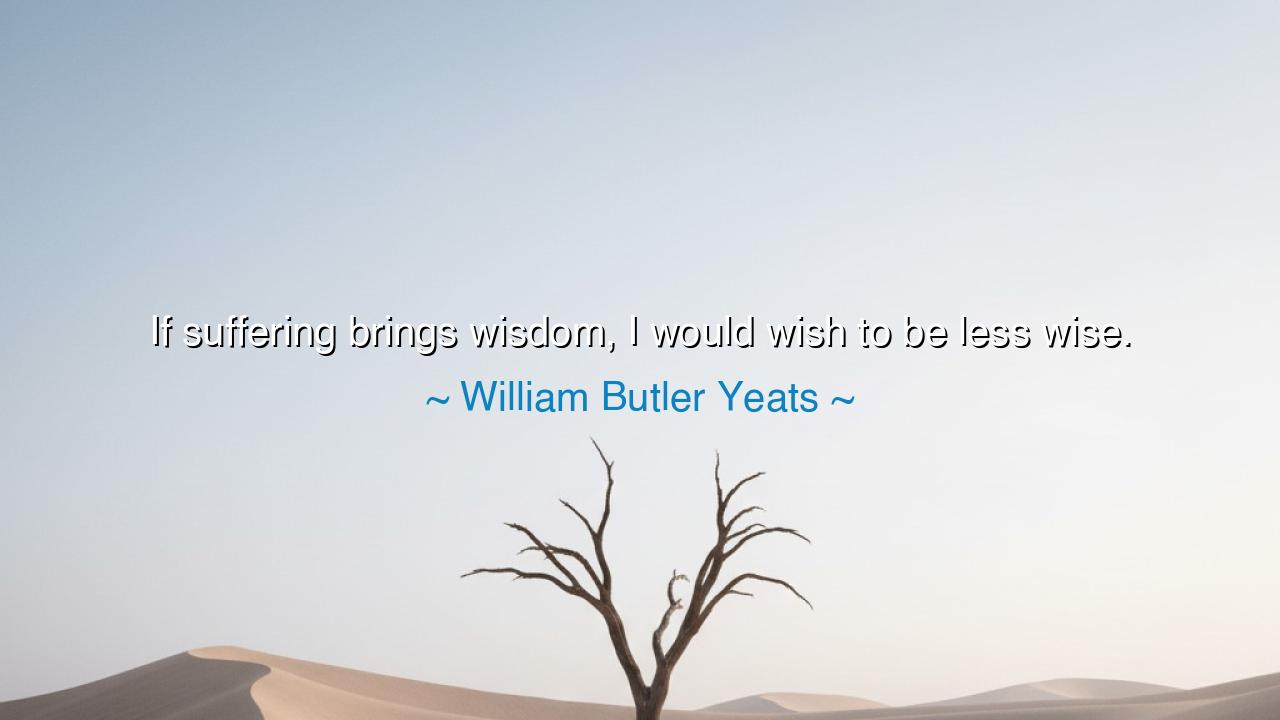
If suffering brings wisdom, I would wish to be less wise.






William Butler Yeats, poet of Ireland’s soul, confessed with weary honesty: “If suffering brings wisdom, I would wish to be less wise.” In this lament, he pierces the veil of romantic notions that glorify pain as the sole teacher of truth. For though it is often said that hardship shapes character and trial refines the spirit, Yeats reminds us of the cruel cost: to gain such wisdom is to endure wounds that scar the heart. His words are both acknowledgment and protest—an admission that while suffering may yield insight, the price is heavy, and not to be envied.
The ancients taught that grief can purify, that pain can carve the soul into deeper vessels for understanding. And so it often does. Yet Yeats, having seen war, rebellion, and the aching struggles of his nation, voices the truth that wisdom born of anguish is a bitter inheritance. One may become wise through fire, but who would not prefer a gentler road? The poet’s cry reminds us that wisdom gained by cruelty of fate is a gift one might gladly exchange for peace.
History gives us many such examples. Consider Job of the Scriptures, who lost family, wealth, and health, yet emerged with profound insight into the mystery of God and man. His wisdom was unmatched, but it came drenched in tears. Or think of the survivors of the world’s great wars, who carried with them hard-earned understanding of life’s fragility. Their voices shaped nations with lessons of peace, but how many of them, like Yeats, would have gladly chosen to remain less wise, if only it meant avoiding such suffering?
And yet, Yeats does not deny the truth that suffering and wisdom often walk hand in hand. Rather, he humanizes it, refusing to romanticize what breaks the human heart. His words are a reminder to us: let us not glorify pain, but seek to lessen it where we can, so that wisdom may also grow from joy, from kindness, from love freely given. For wisdom drawn from delight is no less true than that born of grief.
O children of tomorrow, take this teaching to heart: do not rush to embrace suffering as though it were a crown. If wisdom comes by pain, let it come, but never seek pain for its own sake. Let your pursuit of wisdom be tempered with compassion, so that others need not bleed to learn. Remember Yeats’s cry—he who had known sorrow’s school would have chosen to be “less wise.” Let this move you not to reject wisdom, but to build a world where insight may spring from love rather than loss.






VDNguyen Viet Dat
This quote makes me reflect on the paradox of human experience. We often seek understanding and personal growth, yet we dread the pain required to achieve it. Is it possible to cultivate wisdom through compassion, observation, or creativity instead of suffering? I also wonder if wishing to be less wise is a form of self-preservation, prioritizing peace over insight, and whether that choice might sometimes be the wiser path after all.
LTQuynh nhu Le thi
I’m intrigued by the tension in this statement between desire for wisdom and fear of suffering. Could it be a critique of the idea that life must always be a struggle to be meaningful? I also think about whether some forms of suffering truly lead to wisdom, or if they simply leave scars. How can we differentiate between painful experiences that teach us something valuable and those that merely harm us?
QBNguyen Quoc Bao
Reading this makes me reflect on literature and history, where many characters gain insight only through tragedy. Does Yeats suggest that this cycle of suffering and learning is something to resist rather than embrace? I also question whether modern society’s obsession with resilience and self-improvement undervalues comfort and contentment. Is it better to live a less enlightened but more peaceful life than to endure pain for the sake of knowledge?
VPNguyen vu phong
This perspective seems both honest and slightly cynical. I wonder if it implies that wisdom gained through suffering often brings more burden than benefit. Could it be that some knowledge or understanding is too heavy a price for the human spirit? It also makes me question whether those who avoid suffering are truly less wise, or simply experience life differently, and whether wisdom itself always improves our lives.
TDTan Tran duy
I feel a sense of weariness in this sentiment. It makes me reflect on whether our society overemphasizes the connection between struggle and personal growth. Are we too quick to assume that hardship inherently leads to enlightenment? This also raises personal questions: how much pain am I willing to endure for self-understanding, and is it possible to balance the pursuit of wisdom with the desire for happiness and peace?